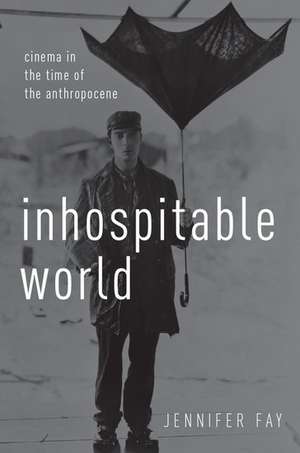Inhospitable World: Cinema in the Time of the Anthropocene
Autor Jennifer Fayen Limba Engleză Paperback – 19 apr 2018
| Toate formatele și edițiile | Preț | Express |
|---|---|---|
| Paperback (1) | 249.30 lei 31-37 zile | |
| Oxford University Press – 19 apr 2018 | 249.30 lei 31-37 zile | |
| Hardback (1) | 700.83 lei 31-37 zile | |
| Oxford University Press – 19 apr 2018 | 700.83 lei 31-37 zile |
Preț: 249.30 lei
Preț vechi: 261.69 lei
-5% Nou
Puncte Express: 374
Preț estimativ în valută:
47.75€ • 49.19$ • 39.100£
47.75€ • 49.19$ • 39.100£
Carte tipărită la comandă
Livrare economică 13-19 februarie
Preluare comenzi: 021 569.72.76
Specificații
ISBN-13: 9780190696788
ISBN-10: 0190696788
Pagini: 272
Dimensiuni: 234 x 155 x 18 mm
Greutate: 0.39 kg
Editura: Oxford University Press
Colecția OUP USA
Locul publicării:New York, United States
ISBN-10: 0190696788
Pagini: 272
Dimensiuni: 234 x 155 x 18 mm
Greutate: 0.39 kg
Editura: Oxford University Press
Colecția OUP USA
Locul publicării:New York, United States
Recenzii
[A] stunningly original and deeply troubling book... Throughout the text, Fay makes astonishing and compelling connections between these films and the collapse of a once ecologically stable world. The result is a groundbreaking, one-of-a-kind book destined to be a classic. This is film criticism at its most urgent and impressive. Essential.
...[an] elegant new book...
Jennifer Fay beautifully writes a wide-ranging and suggestive theory of cinema in the atomic light of the Anthropocene.
Compelling and brilliant on every page, Inhospitable Worlds shows where film figures in the slow burn of the Anthropocene. In five clearly drawn and meticulously documented studies running from Keaton to noir, from China's three gorges to atomic testing sites in Nevada, and from the South Pole to the Yukon, Fay draws attention to contradictions and dilemmas at the core of cinema. Crafting a strategy of melancholy to rethink its condition past and present, Fay turns criticism in new and definitive directions. Anyone having concern about the condition of our planet must read Inhospitable Worlds.
At a time when much of the world is consumed with anxiety about the fate of the planet, Jennifer Fay shows us a way forward by traveling backward ironically and locating our future in the present. Inhospitable World reveals a history of cinema mobilized, as it were, for the purposes of rendering and conveying a world crisis as it unfolds. Cinema, in Fay's hands, is not only a vehicle, nor merely a medium, but a technology designed in part to capture this crisis invisible elsewhere. Not only a breath-taking feat of film scholarship, Inhospitable World is also a genuine contribution to the task of critical thought in a time of despair. It serves as an exhortation.
Inhospitable World teems with cinematic lessons in survival, from the 'survival burlesques' of Buster Keaton to Bill Morrison's chronicle of the Dawson City Film Find. But there's a catch: the survivors of the Anthropocene may not be human. In Fay's arresting account, cinema's profuse world-making hastens, even as it broods on, the unmaking of human futurity. The history of film is retold in these pages as a rehearsal for a world without us.
...[an] elegant new book...
Jennifer Fay beautifully writes a wide-ranging and suggestive theory of cinema in the atomic light of the Anthropocene.
Compelling and brilliant on every page, Inhospitable Worlds shows where film figures in the slow burn of the Anthropocene. In five clearly drawn and meticulously documented studies running from Keaton to noir, from China's three gorges to atomic testing sites in Nevada, and from the South Pole to the Yukon, Fay draws attention to contradictions and dilemmas at the core of cinema. Crafting a strategy of melancholy to rethink its condition past and present, Fay turns criticism in new and definitive directions. Anyone having concern about the condition of our planet must read Inhospitable Worlds.
At a time when much of the world is consumed with anxiety about the fate of the planet, Jennifer Fay shows us a way forward by traveling backward ironically and locating our future in the present. Inhospitable World reveals a history of cinema mobilized, as it were, for the purposes of rendering and conveying a world crisis as it unfolds. Cinema, in Fay's hands, is not only a vehicle, nor merely a medium, but a technology designed in part to capture this crisis invisible elsewhere. Not only a breath-taking feat of film scholarship, Inhospitable World is also a genuine contribution to the task of critical thought in a time of despair. It serves as an exhortation.
Inhospitable World teems with cinematic lessons in survival, from the 'survival burlesques' of Buster Keaton to Bill Morrison's chronicle of the Dawson City Film Find. But there's a catch: the survivors of the Anthropocene may not be human. In Fay's arresting account, cinema's profuse world-making hastens, even as it broods on, the unmaking of human futurity. The history of film is retold in these pages as a rehearsal for a world without us.
Notă biografică
Jennifer Fay is Associate Professor of Film and English at Vanderbilt University where she also directs the Program in Cinema and Media Arts. Her books include Theaters of Occupation: Hollywood and the Reeducation of Postwar Germany (Minnesota, 2008) and Film Noir: Hard-Boiled Modernity and the Cultures of Globalization co-authored with Justus Nieland (Routledge, 2010).
